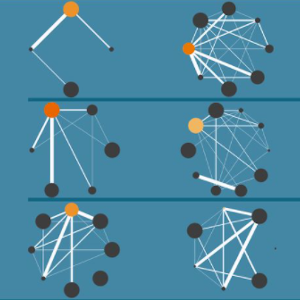Climate shocks can reorganize the social–ecological linkages in food-producing communities, leading to a sudden loss of key products in food systems. The extent and persistence of this reorganization are difficult to observe and summarize, but are critical aspects of predicting and rapidly assessing community vulnerability to extreme events. We apply network analysis to evaluate the impact of a climate shock—an unprecedented marine heatwave—on patterns of resource use in California fishing communities, which were severely affected through closures of the Dungeness crab fishery. The climate shock significantly modified flows of users between fishery resources during the closures. These modifications were predicted by pre-shock patterns of resource use and were associated with three strategies used by fishing community member vessels to respond to the closures: temporary exit from the food system, spillover of effort from the Dungeness crab fishery into other fisheries, and spatial shifts in where crab were landed. Regional differences in resource use patterns and vessel-level responses highlighted the Dungeness crab fishery as a seasonal “gilded trap” for northern California fishing communities. We also detected disparities in climate shock response based on vessel size, with larger vessels more likely to display spatial mobility. Our study demonstrates the importance of highly connected and decentralized networks of resource use in reducing the vulnerability of human communities to climate shocks.
Climate shock effects and mediation in fisheries
Publication date
January 12, 2021
Abstract
Journal
PNAS 2021 Vol. 118 No. 2 e2014379117.
DOI
https://doi.org/10.1073/pnas.2014379117
Region
California Current


